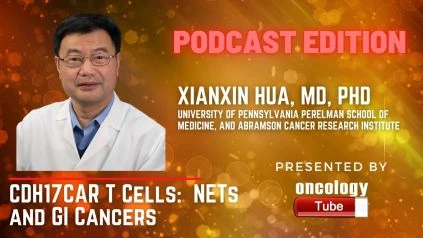Xianxin Hua, MD, Ph.D., Professor of Cancer Biology at the Abramson Cancer Research Institute, Department of Cancer Biology at the University of Pennsylvania Perelman School of Medicine. In this video, he speaks about the Potent suppression of neuroendocrine tumors and gastrointestinal cancers by CDH17CAR T cells without toxicity to normal tissues.
Â
PHILADELPHIA — Although chimeric antigen receptor (CAR) T cells can be extremely effective in treating leukemias and lymphomas, there are currently no viable immunotherapies for neuroendocrine tumors (NETs) and gastrointestinal malignancies (GICs). Penn Medicine researchers discovered that CAR-T cells directed to a tumor antigen, CDH17, a cell surface marker expressed on both NETs and GICs but also on healthy tissues, eliminated GICs in several preclinical models with no toxicity to normal tissues in multiple mouse organs, including the small intestine and colon. The findings of this study, the first to target CDH17 in neuroendocrine tumors, point to the discovery of a new class of tumor-associated antigens that are accessible to CAR-T cells in tumors but not to CAR-T cells in healthy tissues.
Researchers recovered a llama-derived nanobody, a tiny antibody, which led to the identification of CDH17 in the study, which was published March 21 in Nature Cancer. Targeting CDH17, which is mostly expressed in the intestine in people and animals, with CDH17CAR T cells removed gastric, pancreatic, and colorectal tumors in mouse models. While CDH17 is expressed in normal intestinal epithelial cells, the CDH17CAR T cells did not attack them. This is likely due to the CAR T cells being unable to reach or bind to healthy tissue in the tight junction between normal intestine epithelial cells, resulting in a “masking” effect in healthy cells from CAR T attack.
Once GICs and NETs have spread, they are frequently lethal. Every year, around five million new cases of GICs are diagnosed worldwide, highlighting the need for scientific and clinical breakthroughs.

